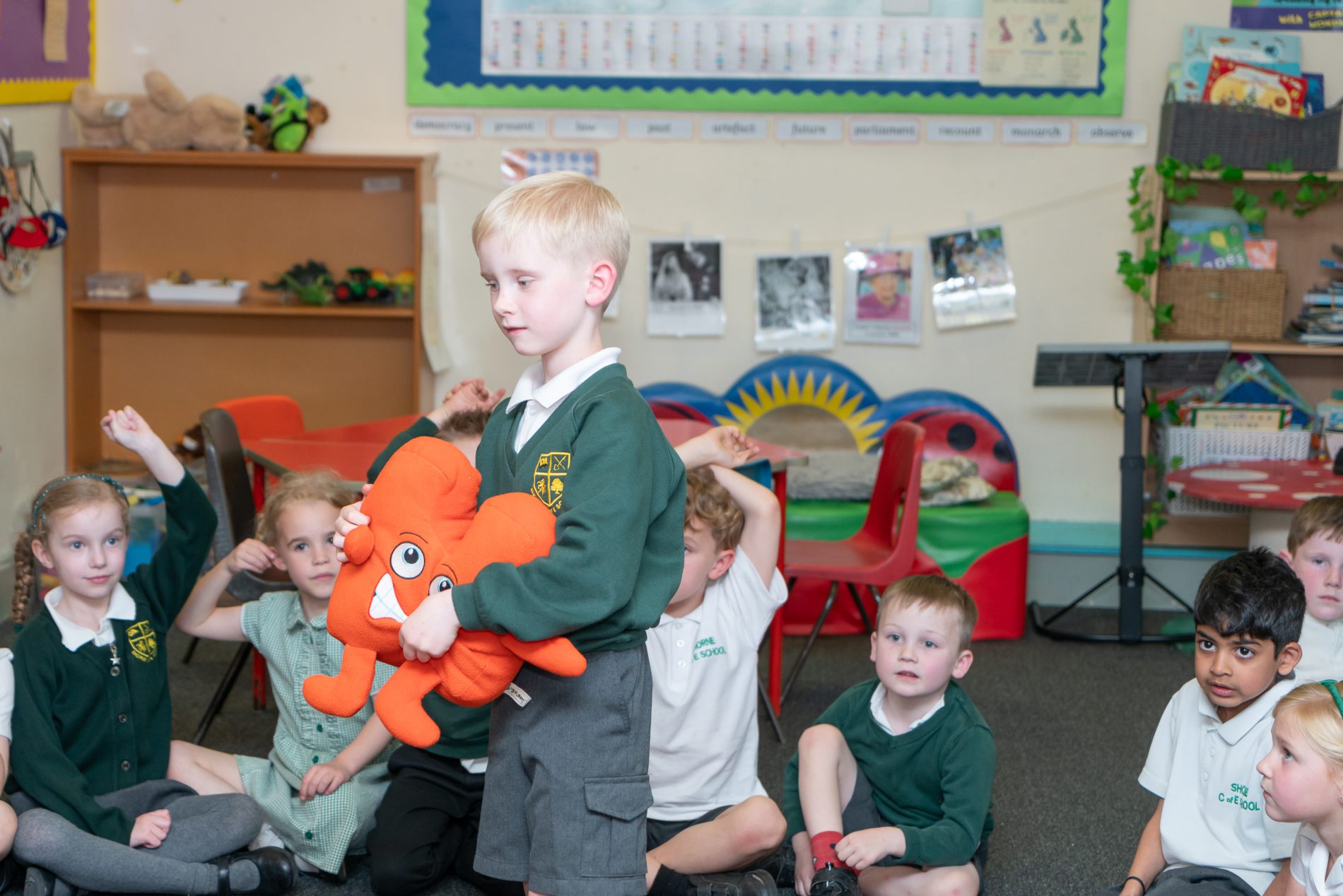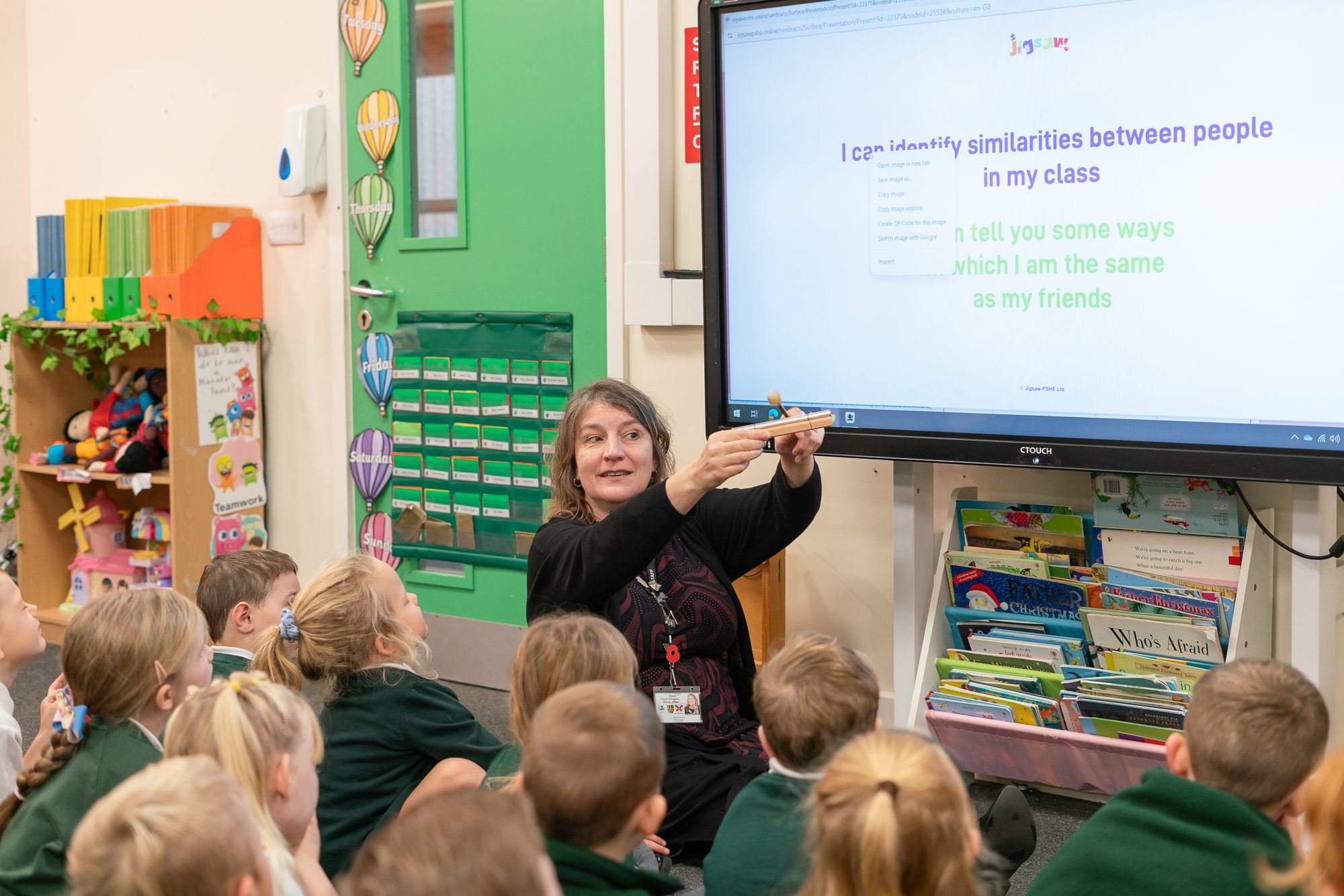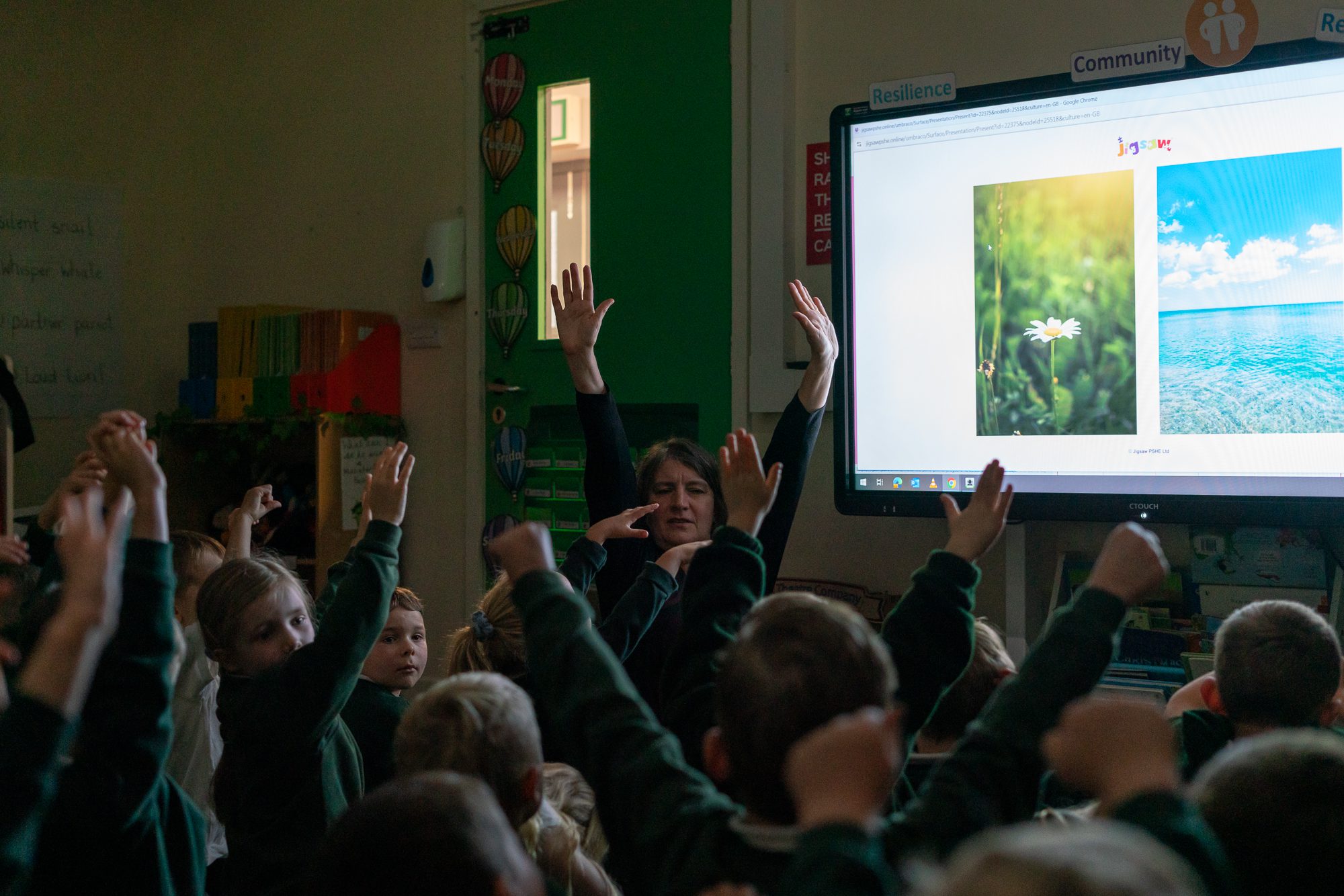PSHE and RSE Subject Leader: Miss T Hewett
Intent
The teaching of Personal, Social, and Health Education (PSHE) is delivered as a whole-school approach to underpin children’s development as people; we believe that this also supports their learning capacity.
The Jigsaw Programme offers us a comprehensive, carefully thought-through Scheme of Work which brings consistency and progression to our children’s learning in this vital curriculum area.
This also supports the “Personal Development” and “Behaviour and Attitude” aspects required under the Ofsted Inspection Framework, as well as significantly contributing to the school’s Safeguarding and Equality Duties, development of British Values and the SMSC (Spiritual, Moral, Social, Cultural) development opportunities provided for our children.
We value PSHE as one way to support children’s development as human beings, to enable them to understand and respect who they are, to empower them with a voice and to equip them for life and learning. We include the statutory Relationships and Health Education within our whole-school PSHE Programme.
To ensure progression and a spiral curriculum, we use Jigsaw, the mindful approach to PSHE, as our chosen teaching and learning programme and tailor it to your children’s needs. The mapping document: Jigsaw 3-11 and statutory Relationships and Health Education, shows exactly how Jigsaw and therefore our school, meets the statutory Relationships and Health Education requirements.
This programme’s complimentary update policy ensures we are always using the most up-to-date teaching materials and that our teachers are well supported.
It is also aligned with the Church of England’s “A CHARTER FOR FAITH SENSITIVE AND INCLUSIVE RELATIONSHIPS EDUCATION, RELATIONSHIPS AND SEX EDUCATION (RSE) AND HEALTH EDUCATION (RSHE)” and draws on the advice given in the Church of England document ‘Valuing All God’s Children: Guidance for Church of England schools on challenging homophobic, biphobic and transphobic bullying’ (Church of England Education Office, second edition updated summer 2019).


Implementation
Jigsaw covers all areas of PSHE for the primary phase including statutory Relationships and Health Education. The table below gives the learning theme of each of the six Puzzles (units) and these are taught across the school; the learning deepens and broadens every year.
| Term | Puzzle (Unit) | Content |
|---|---|---|
| Autumn One | Being Me in My World | Includes understanding my own identity and how I fit well in the class, school and global community. Jigsaw Charter established. |
| Autumn Two | Celebrating Difference | Includes anti-bullying (cyber and homophobic bullying included) and understanding. |
| Spring One | Dreams and Goals | Includes goal setting, aspirations, who do I want to become and what would I like to do for work and to contribute to society. |
| Spring Two | Healthy Me | Includes drugs and alcohol education, self-esteem and confidence as well as healthy lifestyle choices, sleep, nutrition, rest and exercise. |
| Summer One | Relationships | Includes understanding friendship, family and other relationships, conflict resolution and communication skills, bereavement and loss. |
| Summer Two | Changing Me | Includes Relationships and Sex Education in the context of coping positively with change. |
We allocate weekly discreet PSHE lessons in order to teach the PSHE knowledge and skills in a developmental and age-appropriate way. Class teachers deliver the weekly lessons to their own classes.
These explicit lessons are reinforced and enhanced in many ways:
Assemblies and collective worship, praise and reward system, Learning Charter, through relationships child to child, adult to child and adult to adult across the school. We aim to ‘live’ what is learnt and apply it to everyday situations in the school community.
Impact
The Jigsaw Scheme of Work seeks to ensure that children learn and develop values and an appreciation of themselves and others that will support them in their journey through adolescence into adulthood and teach them to be people who contribute to society and respect and support those around them.

PSHE and RSE in Each Stage
Children learn about how they have similarities and differences from their friends. They learn about responsibility and children’s rights. Friendship and kindness are taught, promoted and celebrated, but also how to deal with unkindness. Goals and dreams are discussed, and children learn about the resilience and perseverance needed to reach these goals, and feelings around these. Healthy bodies and minds are a key part of PSHE learning in EYFS, and children learn ways to keep healthy and safe, including healthy eating, the benefits of sleep and stranger danger. Children learn about key relationships and families, and the roles people can play in a family. They are also introduced to Calm Me time, and ways to use this when feeling angry or upset. Children also look at changes in their bodies over time – from when they were a baby until now and then in the future. They name and learn about functions of main body parts. They learn about change and memory, and the role that memories can have in manging change.
Children learn about what makes us unique and special, differences and similarities between girls and boys and gender stereotypes. They talk about bullying and what this means, as well as how this can make us feel and ways to deal with this. They learn that it is okay to disagree with or have different likes to our friends. Children discuss their goals, the difficulties they may face reaching them and the perseverance needed to overcome challenge. Healthy choices, both for bodies and minds, are learned about, and children begin to understand why certain foods are good for us. They consider what makes them feel relaxed or stressed. Children in Key Stage 1 consider wider relationships, such as those within the school community, and the importance of co-operation, appreciation and trust. There is a focus on falling out and mending friendships to provide children with the tools needed to deal with disagreements. Children also learn about people who can help them if they feel worried or scared. Children are taught the correct names for body parts in Key Stage 1. They are taught that nobody has the right to hurt private parts of their body, and also that change is a natural part of growing up. Children also learn about their growing responsibilities and independence as they are getting older.
Children learn about recognising their self-worth and achievements. They set goals, identifying barriers, fears and challenges they may face on their journey to their goal. They learn about their behaviour, responsibilities and rights, and how their choices result in consequences, positive and negative. Children consider democratic approaches to decision-making, and they collaborate to establish a Jigsaw Charter related to choices and actions. Celebration of difference is a key part of pupils’ learning, and a recognition of and respect for the diversity of our community, locally, nationally and globally. Racism, judging by appearance, different types of families and social, economic, cultural and spiritual differences are discussed. Children learn about the impact bullying can have on others and themselves. They also learn about disabilities and educational needs. Global issues are discussed, and ways that people can be courageous advocates for causes or actions that create change. Children reflect on personal success and the kinds of actions they may take to achieve their goals and dreams. Children learn about keeping their bodies healthy, including the risks and effects of smoking, different types of drugs and their effects and what is in our food and how it affects our bodies. They also learn about looking after their mental health, considering the impact of the media, eating disorders, how to deal with peer pressure, body image and ways to deal with stress. They investigate online safety, and topics such as grief and loss, jealousy and communicating with friends and family in a positive and safe way. Puberty how our bodies change during this time is introduced and built upon across Key Stage 2. They learn about internal and external changes to the body, and how a baby is formed. They also discuss self-esteem and self-image during this time to support the changes they may experience. Children learn about the importance of mutual respect in relationships and not being pressured into doing something they do not want to do. Children also learn about transition and dealing with change.
PSHE and RSE Progression
Assessment
Teacher assessment is ongoing and forms part of our planning process in all subjects. Pupils’ attainment in all subjects is tracked 3 times per year against teacher assessment frameworks.
SEND Information
Interventions, support, and challenges are constantly revised and adapted to ensure all children are supported in achieving learning. Learning is robustly and continuously monitored and assessed to ensure gaps in learning are addressed. Teachers and support staff offer adaptive teaching to enable access for all, and may provide scaffolds, pre-teaching, and other support and intervention, as outlined in the Kent Mainstream Core Standards. Pupils may also be supported to access learning through the use of Clicker software.

